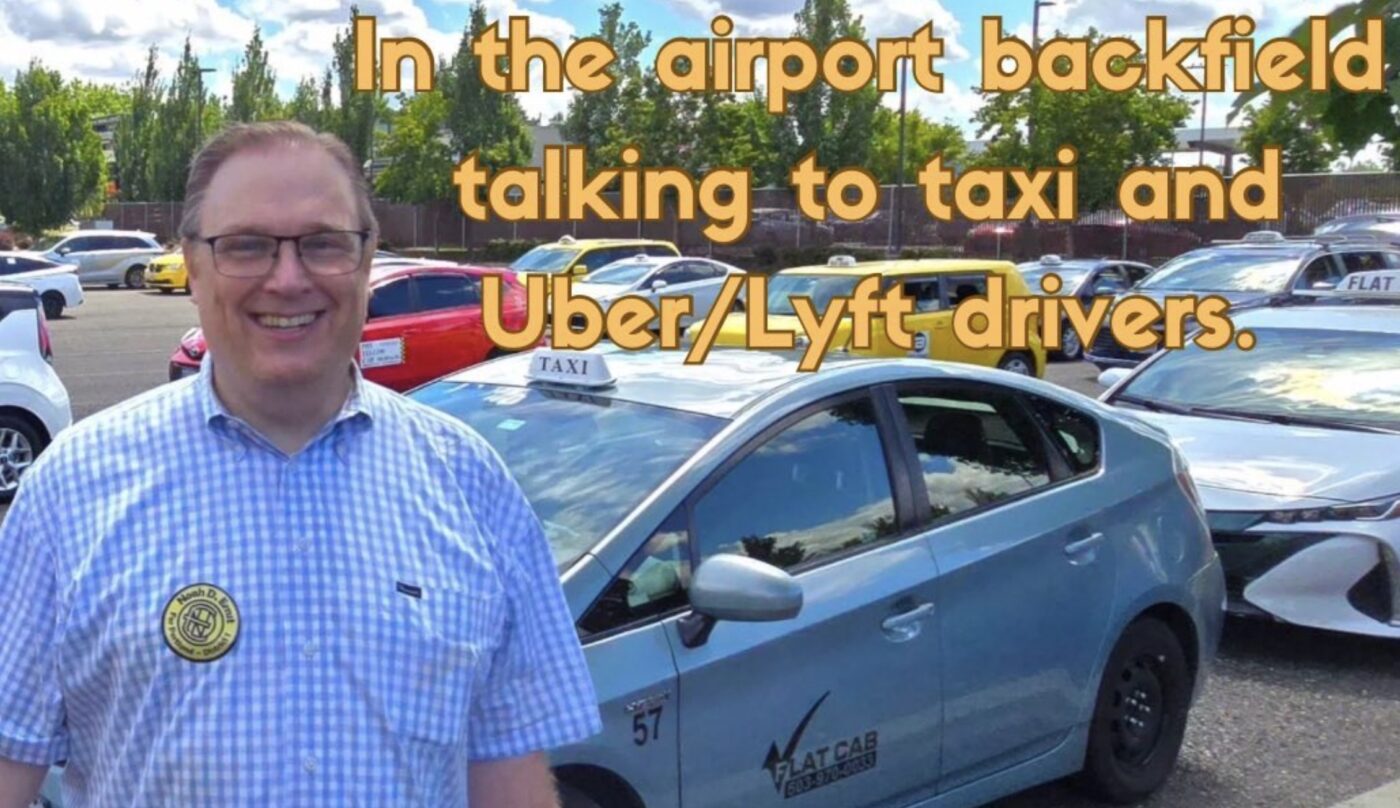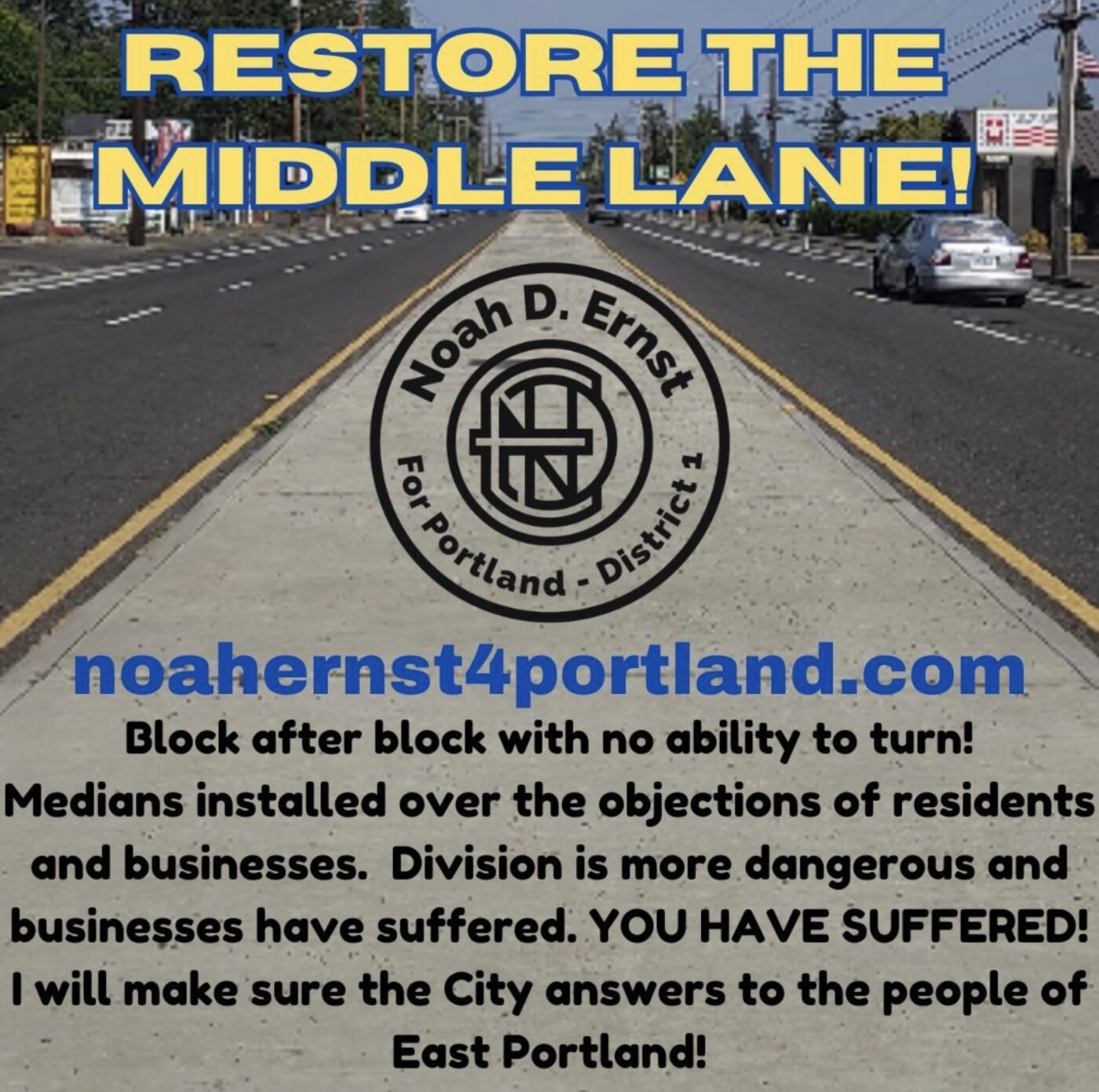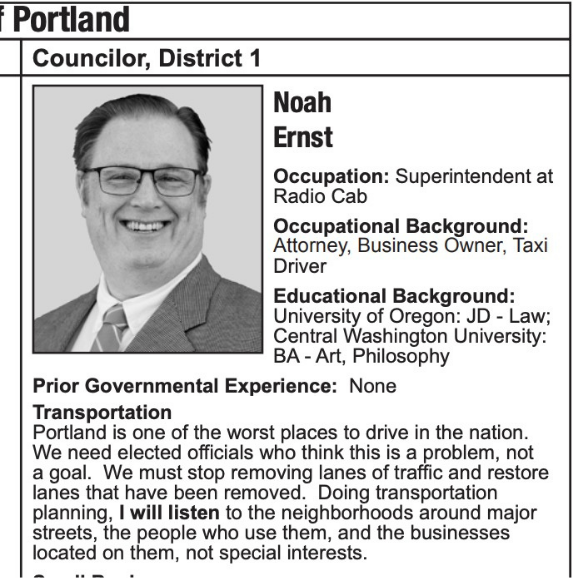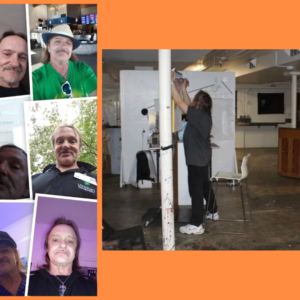
I’ve been tracking City Council District 1 candidate Noah Ernst since this past spring — ever since he started posting about transportation on his Instagram account. Now that Ernst has picked up an endorsement from The Oregonian and was just in the news for being hit by a drunk driver while operating his cab on Sunday, I figure it’s a good time to share a bit more about him.
According to a story by KGW and Ernst himself, he was on SW 15th crossing northbound onto W Burnside when someone plowed into him. Luckily it was relatively low speed and Ernst wasn’t seriously injured. The other driver was cited for driving under the influence.
It’s notable that Ernst was involved in a traffic collision because he’s by far the most outspoken critic of Portland’s approach to traffic safety among the 100 or so candidates running for City Council. “I don’t know if it’s ironic,” Ernst told KGW. “It’s certainly incredibly frustrating, but at the same time, at least, I can use myself as an example to say, ‘Look how badly things are going. Look how we need to make changes we need to make the city of Portland and better place a safer place’.”
I don’t know the details of how the collision happened, but Ernst might take solace in the fact that the Portland Bureau of Transportation just lowered the speed limit on W Burnside to 20 mph in the segment where he was hit (between 2nd and 24th). I know a lot of people dismiss speed limit decreases without enforcement; but making a marquee street like Burnside the same maximum speed as a residential neighborhood street is a pretty big deal!
I think we need more critics like Ernst in order to have a healthy debate about our approaches to difficult problems like how to tame east Portland arterials and eliminate the fatal crashes that plague them. I also think it’s interesting Ernst believes the solution to safer streets and preventing crashes like the one he was in, is to make driving easier and to encourage more of it.



He wants to remove the center median recently installed on SE Division because he alleges it has made the street more dangerous and has hurt businesses. He says PBOT road designs have caused too much congestion for drivers and laments that Portland is ranked one of the “10 worst cities to drive in.” Ernst doesn’t use “war on cars” rhetoric like one of his competitors in District 1, Terrence Hayes, but he clearly believes PBOT’s approach is too hard on car users.
On a recent episode of the NW Fresh Podcast, Ernst responded to a statement from the host that too many decisions in Portland cater to a, “very small, vocal, loud segment” of the population. “My favorite example of that,” Ernst eagerly replied. “Is there is a bicycle committee that advises PBOT on literally every transportation plan that they introduce… And bicyclists make up less than 5% of the commuters. But 80 plus percent of the commuters on a daily basis are in cars — yet they have no input at all in any way on a committee level or anything else in transportation policy that’s being adopted by PBOT.”
Ernst is a former cab driver and now works as legal counsel for a cab company, so it’s easy to see where some of his interests lie. But it should be said that he either doesn’t understand how PBOT and their advisory committees work and/or he’s willfully misleading District 1 voters to make a political point.
PBOT has three transportation advisory committees: bicycling, pedestrian and freight. I’ve attended all three of them many times over the past two decades (especially the bicycling one, which I rarely miss). One of the chief complaints of the bike committee is that it has almost no influence over PBOT, much less any influence in City Hall. The freight committee is the one that really throws its weight around. Unlike the other two committees whose members are unpaid individuals, freight committee members are mostly professionals from freight-related businesses or advocacy groups who are being paid to attend the meetings (it’s chaired by Oregon Trucking Association President Jana Jarvis, arguably the most influential transportation advocate in the state).
And while Portland doesn’t have a Driving Advisory Committee, the freight committee does a great job advocating for pro-driving policies. They are staunchly supportive of wider driving lanes and regularly advocate for pushing bicycle users off main roads and onto side streets. That’s the same position Ernst likes to take. And for what it’s worth, the vast majority of bicycle committee members are also drivers (the idea that Portlanders can be divided up into mode labels is convenient for political stump speeches, but has no basis in reality). It’s also a fact that PBOT planners and engineers have a “design vehicle” for every project they build — a vehicle they consider when determining routes, turning radii, lane widths, and so on. Their design vehicle for road projects is an Ford F150 truck.
On the east Portland arterials where we suffer the majority of our fatal crashes — including four this past week alone — Ernst wants driving to be easier and faster. “What PBOT refers to as ‘high crash corridors’ are simply the main arteries that most of us use on a daily basis to get around Portland,” Ernst has said on the campaign trail. “While PBOT attempts to characterize those streets as especially dangerous, the truth is (all things being equal) we would expect that 74% of accidents would occur where 74% of the traffic is. These streets are not necessarily especially dangerous, they are just especially busy. For good reason. They are the most efficient routes.”
Ernst believes it’s possible to improve conditions for drivers and still make roads safer for everyone. He says we’d save lives by cracking down on impaired and speeding drivers during late night hours. “Impeding the smooth and efficient flow of traffic on main thoroughfares during our daily commutes won’t address that problem. Increased traffic enforcement during those hours will,” he writes.
In the voter pamphlet, the statement from Ernst reads: “Portland is one of the worst places to drive in the nation. We need elected officials who think this is a problem, not a goal. We must stop removing lanes of traffic and restore lanes that have been removed.”
I appreciate that Ernst is thinking and speaking about these issues. Unfortunately, his positions on transportation are clouded by his profession and his own preference for driving. It’s wishful to think Portland can provide free-flowing traffic for everyone who wants to drive and simultaneously grow the number of people who choose not to. And thinking we can simply shift the responsibility for safe driving onto the shoulders of police and enforcement is a nice idea; but the reality is our street designs must carry most of the enforcement load.
And promoting the idea that there’s some cabal of bike activists nefariously pulling strings at PBOT and City Hall undermines the good work of a lot of volunteers dedicated to safer streets. And it simply doesn’t match reality.
One final word about Ernst’s comment on PBOT advisory committees: I’ve said many times over the years that I wish we had a Driving Advisory Committee or some sort of driving advocacy group because it would enrich the debate and remove the ability of people like Ernst to imply drivers’ perspectives aren’t being heard. I also think it would allow us to fully air out these debates and I believe we arrive at better outcomes when we embrace healthy discussions among people who disagree — instead of trying to shut them down.
See you on the streets Noah!







Thanks for reading.
BikePortland has served this community with independent community journalism since 2005. We rely on subscriptions from readers like you to survive. Your financial support is vital in keeping this valuable resource alive and well.
Please subscribe today to strengthen and expand our work.
Thoughtful analysis!
I was going to only vote for only one candidate in district 2 (Chris Olson — a socialist with evidence of empathy) but Tasini’s response to you has cemented my second ranking.
https://bsky.app/profile/andersem.bsky.social/post/3l7nxidp3pe2p
Thank you for helping me find someone else I want to vote for!
East Portland (District 1) has always been vastly under-represented on all the modal committees (as well as City Council) – presumably this will change under the new system.
The transportation advisory committee for personal cars and trucks in the city of Portland is called PBOT, in the greater Portland area it is called Metro, and for the state of Oregon it is called ODOT. Like the freight committee, it is staffed by paid employees rather than volunteers and they have a successful track record of prioritizing the use of cars and trucks over all other modes.
And how many voters have cars?
And how many of them ride bikes?
Why would anyone be surprised who PBOT (or any of them) are going to build stuff for is a real shock to me.
Not surprised- just saying that the useful purpose of advisory committees is to represent perspectives that aren’t already represented or potentially over-represented by the organization. Ernst is a total clown to suggest that car drivers aren’t represented. He should be treated like the other crowd of unserious candidates.
The juxtaposition of taxis (a reliable and regulated transportation alternative with some history of unionization) with Uber/Lyft (venture-capital funded “disruptors” that are viciously anti-worker, anti-privacy, anti-consumer, and anti-public transportation) is reason enough to not rank Ernst, ATMO.
It’s also worth noting that many prominent YIMBYs/urbanists have been huge boosters of Uber/Lyft despite the publicly stated desire of these mega-unicorn corporations to compete with and dismantle public transportation:
https://48hills.org/2019/05/ubers-plans-include-attacking-public-transit/
Uber/Lyft have shown that people are willing to pay quite a bit to avoid using transit.
It shows that people wanted an app to easily map their route and pay their fare. And if possible, they’d prefer to exploit workers and not know about it, please. They’re cheaper. It just shows people would prefer to spend less money. Color me shocked!
When Uber and Lyft gained popularity, the regular cab companies had some garbage system of hailing cabs (not really here) or calling them on your phone. An app where you say “I want to go here” and a cab shows up is legitimately better than what existed. On top of that, Google putting their thumb on the scale integrating them with Google maps is just straight unfair. But that’s a one time investment that anyone (including Radio Cab) can use. There’s no value proposition today for Uber and Lyft besides undercutting real cab companies by – get this – exploiting labor. Pretend the employees are contractors to dodge regulations, make them compete for fares, resulting in lower pay and therefore cheaper fares. On top of that, run on free investor money so you don’t have to make a profit and bam, an artificially cheap transportation service is popular. No kidding. That’s a subsidy. Fareless square was popular too, maybe we should bring back more fareless options.
Radio Cab app:
If predatory tech mega-unicorns had to play by the same rules as local cab companies they would have to pay their workers a fair wage with state-mandated benefits instead of treating them like disposable “contract workers”.
Agreed, it looks like they fixed it. I’m just saying, when Uber/Lyft first gained popularity, in my opinion the only reason that happened was that they under pay workers and had a good app. Now it seems the app gap is closed, and the only thing left is they exploit workers.
This is how innovation works. Radiocab was forced to fix their problems because Uber/Lyft ate their lunch by providing a better product.
I personally despise Uber/Lyft and have never spent a penny on them, but you are forgetting the history here.
If a company makes use of the Portland/Oregon commons it should abide by the same rules and labor regulations as its competitors. The decision to open up Portland to Uber after they started operating here without any kind of license is just another example of how liberal/”new middle” Portland has failed to protect workers and the commons from the predatory capitalism.
I’ve taken an Uber twice in my life, both times because transit failed me on the way to the airport, so I’m hardly an apologist.
But it is clear that a sizable number of people are willing to pay $28 to avoid a $2.80 transit ride. And that’s not because rides are subsidized or transit is not included in Google Maps.
I doubt the value proposition would change much if transit were free.
You mean the taxis that would regularly never show for a call, frequently had lead times of well over an hour, were regulated to the extent they remained the only game in town and only improved on any of these things once they had competition and had exhausted all paths at attempting to prevent that competition in the first place?
Why wouldn’t Uber/Lyft believe they could pull people from public transportation, its like shooting fish in a barrel? Offer convenience, personal space, and the relative sense of safety, and its worth every single penny.
John and PS can both be saying accurate things at the same time. Go figure!
The idea of “relative sense of safety” is laughable. I stopped taking Lyft after a stretch of absolutely unhinged drivers. Driving the wrong way down one-ways, driving without headlights on, treating their gps like a video and not looking at the road at all. I literally bailed out of a car late at night in a desolate part of town because if I had to get back on a highway with the very confused driver, I’m certain we would’ve crashed. I had only caved to taking them bc my employer was paying for them but the experience of riding IN them is about the same as riding a bike on the street with them. The vast majority of them are unqualified and inattentive.
Give me a trimet driver any day.
Streets are not safe in Portland because of terrible driving on poorly designed streets. The failure of elected officials to prioritize safety over speed is staggering
Cars are weapons and must be strictly regulated.
Driving is a privilege, not a right.
It should be much harder to get a driver license than it currently is.
In 16 USA states in 2020, people driving cars killed more people than people with guns killed people… https://vpc.org/studies/gunsvsmotorvehicles22.pdf
Safety advocates have been trying to change these narratives for many years, it’s sad to see a city council candidate be so ignorant.
There’s a traffic safety movement going on in Europe, led by 50 years of dutch traffic technology and 30 years of swedish vision zero efforts. Paris is taking streets back from cars at an incredible rate. All of these safety improvements are predicated on removing mode conflicts with speeding vehicles and *slowing* cars. We have vision zero efforts that are working in the US, in cities where they’ve actually slowed car traffic like Jersey City and Hoboken.
Personally, I’ve done analysis of the vision zero data from Austin Texas that showed that over 90% of the pedestrian and cyclist deaths occurred on arterial roads or within 200′ of an arterial.
Adding lanes and increasing vehicle speeds goes against every best practice of road safety, and it’s the opposite of what any successful city is doing. There are so many resources out there about this, it’s positively baffling that a city council candidate would claim to be a safety advocate and promote increasing vehicle speeds in dense residential neighborhoods.
Ignorance is why most people run for elected office in the first place – if you aren’t ignorant already, you probably work for government, the nonprofit industrial complex, or are a retiree on your neighborhood association.
The reality is that Portland has grown in population by 50% in the last 30 years and East Portland’s population has doubled, yet the right-of-way network is more or less remained unchanged during that whole time. More people, more cars, a lot more bicyclists and pedestrians, but the same amount of space.
Noah Ernst wants a return to an East Portland that no longer exists, of far fewer people, a higher ratio of police, and so on. He, not unlike most of his competing candidates, has a total ignorance of city finances, internal and external political relationships with other agencies and politicians, induced demand, and so much else. If he knew all we want him to know, he would never even think of running for office. This is true of all the other candidates too.
He is a politician, so therefor he is also ignorant, by definition.
“…Ernst might take solace in the fact that the Portland Bureau of Transportation just lowered the speed limit on W Burnside to 20 mph…”
Lowering speed limits without enforcement is performative nonsense. Something our Portland government excels at.
I disagree.
Lower speed limits are not the only thing or the most impactful thing, but they do matter and they play an important role in the overall picture of building a safer city. Lower speeds give police more power to cite people (when and IF enforcement happens of course!) at a lower speed. Lower speeds also help people who are victims in traffic crashes in their claims against people who were speeding prior to the collision (because the guilt is higher based on how many miles over someone is going). Low speeds also help create better infrastructure. Often engineers and planners will only consider certain infrastructure designs when speeds limits are at specific levels. This stuff is in guide books and it matters a lot. They are also an important cultural signifier and once we get our society to be less dysfunctional and start doing more enforcement, the value of low speeds will really see it’s potential.
When I hear people dismiss low speed limits as being “worthless without enforcement” I often think this is just an easy way to want to maintain the speeding status quo and that the person really just doesn’t like the idea of needing to slow down. You might not be like that, but that’s what reactions like yours imply to me.
I agree, even if some people slow down it’s a win. Despite low compliance rates it is a step in the right direction and is a notable safety impact for a low amount of money that mainly requires political will and changing some signs. Similar to banning right on red or banning parking near intersections, two other policies we could enact overnight that would make our streets significantly safer.
Yes Anomalee, particularly if we design roads that are one lane for each direction. It only takes a single miscreant law abider to slow everyone down to around the posted speed 🙂
Alright, so here’s the thing: when laws are just blatantly ignored (like, hey, these shiny new lower speed limits), it’s not exactly sending the message that laws are actually meant to be followed. It starts with ignoring speed limits—then it’s, “Why not roll through a red light? Park wherever? Toss my trash wherever I please?” Next thing you know, it’s like, “Maybe I’ll break a window or two; who’s really watching?”
This whole “hands-off” approach has done wonders for Portland (and I’m saying that with all the sarcasm). Don’t get me wrong—I’m all for lowering speed limits if it actually helps. But, if there’s zero enforcement? Congrats, we’ve basically just written a suggestion in fancy legal language.
Yes, exactly. Many bank robbers, drug kingpins, and murderers share a common trait of having grown up in areas where speed limits were lowered without adequate enforcement, just as many white collar criminals trace their path into crime back to their participation in youth athletics with lax officiating.
Even more troubling is that bicyclists and pedestrians who regularly run red lights for decades, and who keep voting for the same politicians and expect different results each time, eventually end up becoming Portland city bureaucrats, community active transportation advocates of the nonprofit industrial complex, and cynical readers and editors of certain alternative media and blogs. When will it all end?
I don’t think most liberal/progressive urbanists are capable of this kind of self-criticism … but they sure love pointing their fingers at the “just one more lane, bros” while voting for the same craven establishment democrats.
The folks that speed through my neighborhood at 40+ on a 20 MPH posted street will likely speed in your neighborhood too.
See how that could work? No one said anything about speeders leading to harder criminality. It’s like saying all pot smokers will be doing lines of cocaine next.
~ SolarEclipse
~Mary S, immediately above your comment.
It’s exactly what the comment I responded to said. That’s why I wrote my comment.
When we have a 20 mph posted limit and police officers who are on a speed limit enforcement “mission” only ticket drivers going 11 mph over, the resulting 31 mph top secret speed limit still gives a pedestrian struck by a motor vehicle at least some chance of survival. The odds go down sharply as speed increases.
The 11 mph margin is based on a quote from a police officer in BP, and yes speed enforcement is hypothetical.
If all motor vehicle drivers employed by the city of Portland strictly obeyed traffic laws it would make the city a little safer for everyone. You can’t speed when there’s a dump truck in front of you driving the speed limit and stopping for yellow lights.
Jonathan made a strong case that lowering speed limits actually helps, and you didn’t rebut his points, so it sounds like you’re all for lowering speed limits (AND you’d also like more enforcement than we have now).
Yay for agreement!
Does anyone know if mayoral candidate and trucking company CEO Keith Wilson has any connection to either the trucking association or the the freight advisory committee?
I just asked him and he replied that he is not on the freight advisory committee but does have direct connections to people who are.
He does not.
The endorsement from the Oregonian shows how desperate they have become to hold onto a “conservative” block in the new council system. This candidate seems like a joke that isn’t funny.
The “One More Lane Bro” of candidates
I can’t believe there’s no special committee representing my best interests. Life is so unfair to me.
The worst cities to drive in are often the best cities to live in. (I miss you, Barcelona!) Let’s design and maintain for humans, not for motor vehicles.
This is just another incredibly round-about way to say:
Let’s help organize a left-wing political movement and empower it at the ballot box and at the level of community assemblies (dual power).
https://www.bcnuej.org/2018/04/06/barcelona-superblocks-how-socio-political-power-struggles-shape-transformational-adaption/
Is that an accurate assessment of what Ernst wants? I certainly don’t think Noah wants people to speed and for streets to be less safe. It seems that is what you are implying here.
No, he doesn’t want people to speed. He just wants to raise the speed limit so they are not speeding by definition.
(which, I guess I have to say, makes the streets less safe)
Where does Ernst say he wants to raise speed limits?
“Ernst wants driving to be easier and faster” seems like an accurate summary of his views, at least based on the posts of his included in the article.
Where/how are you seeing that that, or anything else in the article, implies that he “wants people to speed and for streets to be less safe”?
I can see where his views on what to do could encourage speeding and make streets less safe, but I don’t see anything Jonathan wrote that implies that Ernst WANTS that.
Maybe you should go read his campaign website:
https://www.noahernst4portland.com/priorities
I had. No where does he say he wants to raise speed limits despite such allegations by John V.
He wants driving to be easier and faster. I think that is clear from his website.
I did not assert that he wants to increase speed limits, and I wasn’t replying to John’s comment. I was replying to yours.
When I worked at PBOT 2000-2006 as an intern and GIS Tech mapping curbs and sidewalks, the traffic engineers would show us their working model on their street designs – it was more often than not a semi-trailer big rig, but sometimes one of those big rear-driven ladder fire trucks, and on some stroads a 60-foot TriMet bus and on some others a 40-foot bus. The Ford F150 truck is a new one to me, which would indicate that the city wants to put in sharper turns and lower turn radii. When they get to the point of a Tern bike or a moped we’ll likely see a very different city, more like Siena or Bruges rather than a Mannheim.
I’m a bit surprised it isn’t a Prius.
The next logical step should be a Subaru Crosstrek tactical edition.
I’m sorry for Noah’s injuries.
But based on what I’ve read here, if I was in district 1, I’d make sure to not rank him on my ballot. I live in district 3, but in the sliver north of Division that’s east of 82nd. I worked in Gresham and bike commuted through district 1 for 25 years. I’ve taught in District 1 schools. And I remember what my life was like years ago when I spent hours every day commuting by car, so I can mentally put myself in that place where you can make yourself believe that if the streets were wider and we didn’t have so many damn bike lanes/bus lanes/concrete medians/stoplights/lower speed limits/curb extensions, crosswalks,RRFBs, traffic cameras…my life would be easier and I’d get where I need to get faster and more efficiently.
It’s selfish, self/auto-centered, and frankly dangerous thinking. I truly do feel bad for anyone who makes their living behind the wheel of a car; I can hardly imagine a more depressing or unhealthy job. But I certainly don’t want someone who wants to make that work “easier” making transportation decisions for Portland.
I appreciate this thoughtfully written article and how he has been called out on some of his transportation policy positions. I know Noah to also be thoughtful person who engages with dialogue. I would encourage people to not box him in as categorically anti-bike or anti-inter modal transportation. He is the sort of guy who can grow from this sort of critical article about him.
Thanks for sharing that Dave. I noticed he “liked” the story on Instagram and also re-shared it to his followers.
Not sure how you expect to have a “healthy debate” with someone who (by this article’s own admission) is willfully misleading voters and whose arguments have “no basis in reality”. Ernst is pushing the same propaganda we’ve seen a million times over from the fossil fuel lobby and car-brained culture warriors. Anyone trying to “debate” this guy will just be running around in circles fact-checking every misleading talking point (see below). In the meantime, the propagandist has glibly spouted another ten or twenty pieces of blatant misinformation.
FWIW, Portland earned its spot in the “10 worst cities to drive in” due to two main factors: weather and car theft. Last I checked, PBOT doesn’t control those things. The third factor was having an average rush hour speed of 23 mph. Which is good, actually, since lower speeds reduce car crashes. (If nothing else, this should please Ernst since crashes cause sudden lane closures which disrupt traffic flow.)